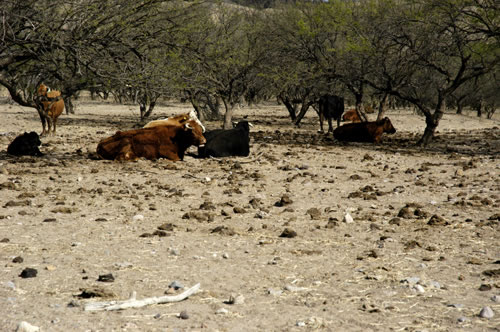Cows in the commons
The rational herdsman concludes that the only sensible course ... is to add another animal to his herd. And another; and another.
But this is the conclusion reached by each and every rational herdsman sharing the commons. Therein is the tragedy.
So our story begins... Picture a pasture open to all...... It's a classic story, something that has occurred in medieval villages of England, and in colonial times in Boston, and in the rainforests of Brazil. Land is held "in common" and everyone has the right to let cows or goats or other animals graze there. What happens?
Each goat, cow, or pig is only a small burden on the land. But more and more goats, cows, or pigs get added. Over time the land is degraded by too many of them, and each animal has a harder time surviving. Soon the grazing land is worthless -- denuded of grass, compacted by hooves, and prey to draught and erosion.
In the Boston Common of colonial times, it was wealthy families that kept adding extra goats. Soon the town fathers decided to disallow grazing altogether in the Common.
 In medieval villages, it was often poorer villagers attempting to feed their families who degraded the land. The degradation was used as a justification to remove the land from common ownership, to literally "enclose" the land for the benefit of wealthy landowners -- simultaneously improving the land and causing massive hardship among the landless.
In medieval villages, it was often poorer villagers attempting to feed their families who degraded the land. The degradation was used as a justification to remove the land from common ownership, to literally "enclose" the land for the benefit of wealthy landowners -- simultaneously improving the land and causing massive hardship among the landless.
In the Brazilian rainforest, large-scale ranches sprang up after 1975, exponentially increasing deforestation in the Amazon basin, and primarily benefitting large ranchers.
Overgrazing is a classic example of a phenomenon that has been called the "Tragedy of the Commons". The land held "in common" is the starting point which allows the "tragedy", which includes soil compaction, erosion, loss of pasture and human suffering. But before we analyze this in more depth, I want to introduce a few more examples of the "tragedy of the commons" so read on...
Copyright University of Maryland, 2007
You may link to this site for educational purposes.
Please do not copy without permission
requests/questions/feedback email: mathbench@umd.edu